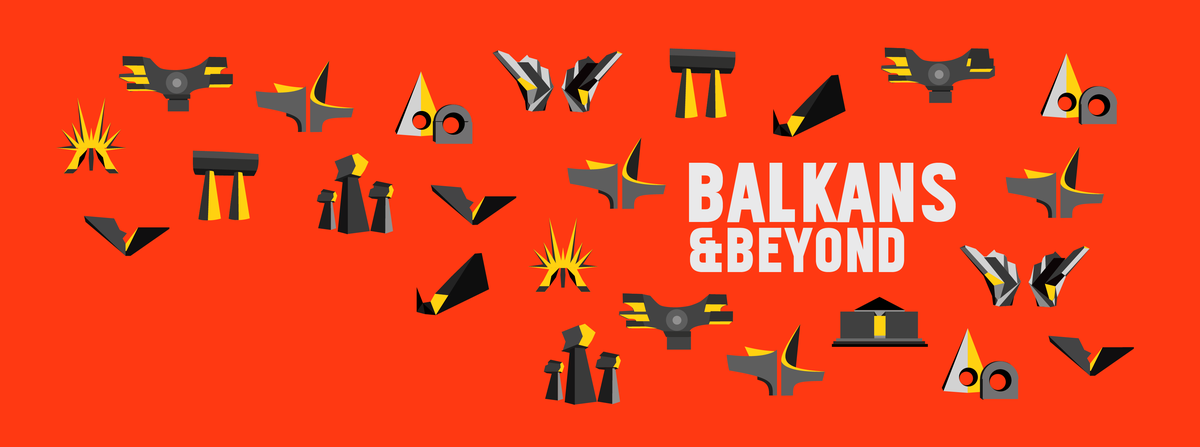
Balkans and Beyond: Books that burn on piles of wood
Published on
Over the next seven weeks, we will be publishing cafébabel Berlin's Balkans & Beyond editorial project, showcasing original stories that beautifully illustrate life and politics in the post-Tito Balkans region. In our opening editorial, Kosovan playwright Jeton Neziraj discusses his memories of war in the region, and the continued trauma that burning books evokes in him.
On several occasions over the course of the last twenty years I have witnessed the intentional burning of books.
At the beginning of the 90s, with the collapse of communism, the grown-ups of my family took the "red" books out of the house where I lived and burned them in the backyard. Works by Karl Marx, Engels, Tito... they spared only one book by Rosa Luxemburg, which apparently did not seem as horrible to them, compared to the others.
Afterwards, during the 90s, I saw how Serbian workers took piles of literature from the National and University Libraries of Kosovo and loaded them onto a tractor, sending them off to be burned. During the war we saw, from the mountains, houses being set on fire. When some of those houses burned more than others, we would jokingly say: "They must have lots of books."
A strange hatred towards books had become commonplace, existing mainly towards those written in the language of the other, the language of "the enemy".
I thought that burning the books of others was perhaps worse than burning their homes, destroying their properties, or expelling them from their homeland.
During the battles, I took the books out of my house and buried them in order to save them from the flames. Later I heard that many people did the same thing.
There is something mythical about this hatred and love of books. I wouldn’t be surprised to discover that, at a certain point in the future, primitive curses such as, "may you die without posterity" or "may you disappear off the face of the earth" were substituted for "may your books be burned".
During the 90s, book burnings were a phenomenon found throughout the former Yugoslavia, in areas of battle, displacement and violence.
Images of books being burned created a kind of trauma in me, a feeling that perhaps one day all books will be burned and we’ll have nothing left. I have often imagined myself living in a world without books – the idea terrified me.
Thus since the end of the war I have carried, books from the four corners of the globe, perhaps in order to confront this trauma. A few years ago in Calgary, a professor opened the door of her office and told me I could take as many books as I wished. I have dragged bags full of book through airport terminals. In order to lighten the weight of my suitcases, I enveloped myself with books – just as suicide bombers envelop themselves with bombs.
"Why are you taking all these books? They’re in German. You don’t read in German," I was once asked by a German friend while filling my bag.
"I’m not taking them to read them, but to have them," I said.
Part of the struggle to put an end to this trauma included the Polip International Literature Festival, which we organize every year in Prishtina. Every year we host around thirty writers, mainly from the surrounding region. This is the festival where Serbian writers, for the first time after the end of the war, read their poems in Serbian in front of an Albanian audience.
When I am asked what it feels like to initiate such literary and cultural interaction between Serbs and Albanians following the war, I say "like an ordinary man walking into a minefield."
The Balkans of today are different from the Balkans of the 90s. They have changed for the better, of course. However, the trauma of flames engulfing books, people, houses, and memories lingers like the weight of the cross on our shoulders. In order for this trauma to fade away, each and every one of us should carry books (just as I do), write books, translate books, and, above all, save books from ever being burned again.
The more books we have around us, the better our future in the Balkans will be.
---
Jeton Neziraj is a playwright from Kosovo.
---




 Beyond clichés. Beyond hate. Beyond the past. 25 years after the start of the Balkans War, cafébabel Berlin's Balkans & Beyond editorial project, showcases original stories that beautifully illustrate life and politics in Bosnia, Macedonia, Croatia, Kosovo, Slovenia, Serbia, and Montenegro. It's financed by Allianz Kulturstiftung and Babel Deutschland with moral support from the Babel International network.
Beyond clichés. Beyond hate. Beyond the past. 25 years after the start of the Balkans War, cafébabel Berlin's Balkans & Beyond editorial project, showcases original stories that beautifully illustrate life and politics in Bosnia, Macedonia, Croatia, Kosovo, Slovenia, Serbia, and Montenegro. It's financed by Allianz Kulturstiftung and Babel Deutschland with moral support from the Babel International network.